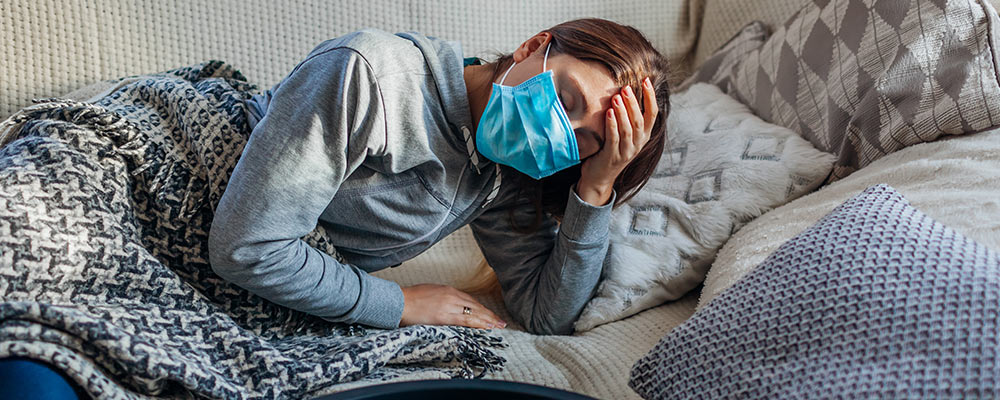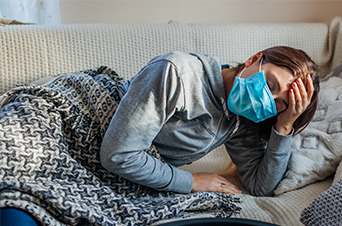
Since COVID-19 has hit the world hard, researchers are increasingly revealing the diverse aftereffects this virus can have on the human body. One area of concern is the potential impact of Covid-19 on sleep health. While covid insomnia has been reported by those who contracted the virus, other sleep disturbances are also reported by individuals with pandemic-related stressors experience.
Understanding the relationship between COVID-19 and sleep problems can help mitigate and control its aftereffects. Moreover, insights into the issue, identification of the root cause, and addressing the situation at the right time can help individuals maintain optimal sleep quality and overall well-being during these challenging times. This guide is all about exploring COVID-19 and its association with insomnia and sleep problems. So, keep scrolling to gain valuable insights into the topic!
Also Read: Is Insomnia Hereditary? What The Research Shows
Does Covid Cause Insomnia?
While COVID primarily manifests as a respiratory illness, its aftereffects may prevail for a longer period. As per the latest research, indications are that approximately 40% of individuals experiencing long covid report encountering sleep-related challenges as part of their symptoms. The question arises, does covid cause insomnia too? Covid insomnia can be characterized by difficulty falling asleep is reported as one of the symptoms of this infection. The reasons for insomnia caused by covid are multifaceted. As much as traditional insomnia is linked with underlying mental conditions such as anxiety or depression, covid-19 insomnia is different as it is linked with COVID and physical or mental stressors.
Surviving COVID itself is a stressful journey that exacerbates lack of sleep, turning it into a tiring and vicious cycle. Moreover, the psychological stressors associated with the pandemic, such as fear of illness, uncertainty about the future, social isolation, and financial concerns, can exacerbate covid-19 insomnia.
Furthermore, medications used to manage COVID-19 symptoms or pre-existing conditions may have side effects that interfere with sleep. Lastly, the complex interplay of physical, psychological, and environmental factors during the COVID-19 occurrence or its aftereffects can significantly impact sleep quality, sleep problems, and contribute to the onset or exacerbation of insomnia.
See Also: Psychophysiological Insomnia: Everything You Need to Know!
Why Does Covid Cause Insomnia?
After highlighting the direct and indirect association to the question ‘does covid cause insomnia?’ the next most common question arises, ‘why does COVID cause insomnia?’ There could be several reasons behind COVID causing insomnia. Firstly, the physical symptoms associated with the virus, such as fever, cough, body aches, and difficulty breathing, can directly disrupt sleep patterns. In addition to this, respiratory distress may lead to discomfort and difficulty finding a comfortable sleeping position, further exacerbating insomnia.
Furthermore, the psychological toll that it takes on an individual’s mental health, future worries, financial constraints, social isolation, and fear of illness can further trigger covid insomnia. The stress and anxiety accompanied by physical distress during and after COVID can disrupt daily routine. This disturbance can promote hyperarousal, making it challenging to relax and fall asleep. Additionally, changes in work and home environment can further stimulate the lack of sleep, resulting in serious sleep problems.
Finally, certain medications coupled with physical, mental, and lifestyle changes collectively contribute to the development of covid-19 insomnia. These medications can further exacerbate the symptoms in affected individuals.
How Long Does Post Covid Insomnia Last?
While the duration of post covid-19 insomnia can vary significantly from person to person, some individuals may experience it for relatively a short period post COVID whereas others may suffer a little longer. Studies on the exact time of lingering covid insomnia is still evolving. However, to assess the persistence of sleep problems, researchers conducted a survey of over 650 long COVID patients. They revealed that even after six months post-infection, around 41% of the patients experienced sleep problems.
Moreover, there are several factors that may influence insomnia and its duration. These factors may include severity of the infection, pre-existing health conditions or underlying conditions, and mental health.
Furthermore, some might wonder about insomnia caused by COVID and its duration while the infection prevails. Here are insights and a few details into it.
How Long Does Covid Insomnia Last?
For many individuals sleep problems or Insomnia may occur during the peak of this infection and resolve as the illness subsides. However, some severe and long COVID cases might face covid-19 insomnia even after the infection has subsided. As COVID affects individuals differently, some may suffer from severe and prolonged sleep disturbances. If insomnia persists or becomes severe, it’s important to seek medical advice for proper evaluation and management.
Insomnia When Sick with Covid
Insomnia caused by covid or coronasomnia is a term that vividly defines sleep problems stemming from COVID infection. Sleep disturbances during this phase stem from various factors beyond just contracting the virus. These factors can have different effects varying from person to person. Some of them are discussed below;
- Change in Routine: Disruptions in routine can have an adverse impact on sleep health, resulting in abrupt shift of body’s internal clock or circadian rhythm. This sudden change may lead to sleep interruptions and sleep problems.
- Quarantine and Stress: For many individuals pandemic has bring forth social isolation incurring a negative impact on mental health and well-being. Further, stress and worries regarding health, financial constraints, business loss, and prevailing pandemic situations have driven many to stress and anxiety. These factors collectively contribute to lack of sleep and covid-19 insomnia.
- Psychological factors: It is found that individuals with this infection suffer from higher levels of anxiety and depression, resulting in lack of sleep and covid insomnia.
- Underlying Sleep Conditions & Limited Medical Care: During the pandemic, many already suffering from undiagnosed or misdiagnosed underlying sleep condition suffered severely. Accompanying this covid infection, the sleep problems exacerbated, leading to severe insomnia.
In addition to this, many avoided seeking professional help or medications from hospitals during the pandemic. The fear of contracting the virus resulted in limited medical care. This aggravated underlying sleep problems. Since these sleep disturbances were prevailing already, insomnia caused by COVID exerted a major negative impact on overall sleep health.
Managing Covid Insomnia
Addressing sleep disturbances related to COVID may call for the need of practicing healthcare providers and their expert guidance. They commonly employ cognitive behavioral therapy, light therapy, and melatonin supplementation. Sometimes healthcare professionals use a combination of these options to treat the prevailing insomnia or related problems.
- Cognitive Behavioral Therapy: CBT is a structured therapy aimed at identifying and altering negative thoughts and behaviors contributing to sleep disturbances. It may involve techniques such as relaxation training, sleep restriction, and stimulus control to re-establish a restorative sleep pattern, combatting sleep interruptions.
- Light Therapy: This therapy incorporates exposure to light aiming to regulate the body’s circadian rhythm and sleep-wake cycles. Light therapy is beneficial for individuals experiencing sleep disruptions due to prolonged indoor confinement.
- Melatonin Supplements: Melatonin is a hormone naturally produced by the body to regulate sleep-wake cycles. Supplementing melatonin, particularly in the form of controlled-release formulations, can help mitigate insomnia by promoting relaxation and facilitating the onset of sleep.
Combining the above-mentioned strategies tailored to individuals’ needs may offer effective and proactive relief from sleep problems. It’s essential to consult with a healthcare professional before initiating any treatment regimen to ensure safety and efficacy. Moreover, sleep telemedicine can be a convenient approach to consult and understand sleep health from the comfort of home.
To Summarize
To wrap up COVID and its effects have been linked to the onset of insomnia or sleep disorders. However, the precise mechanisms underlying this relationship remain unclear, necessitating further research. Additionally, the ongoing stress and anxiety associated with living through a pandemic can contribute to emotional distress. This distress can further disrupt sleep patterns.
While the specific impact of COVID-19 on sleep quality requires more investigation, individuals can adopt healthy habits. Moreover, they can consider medications or supplements and alter lifestyle patterns to prioritize and mitigate risks relating to sleep conditions.

